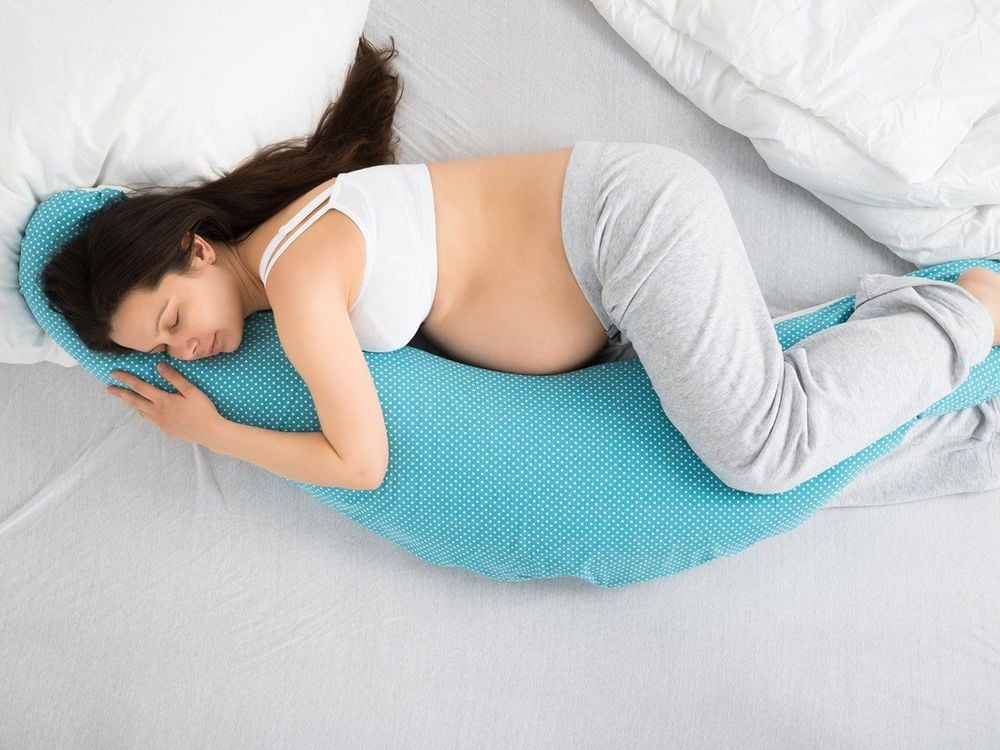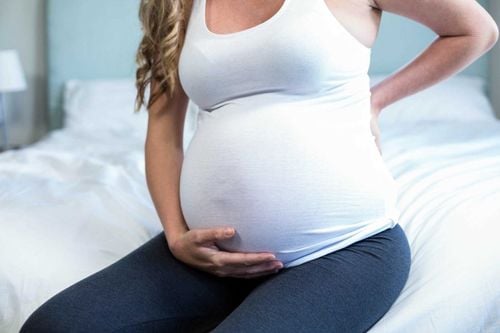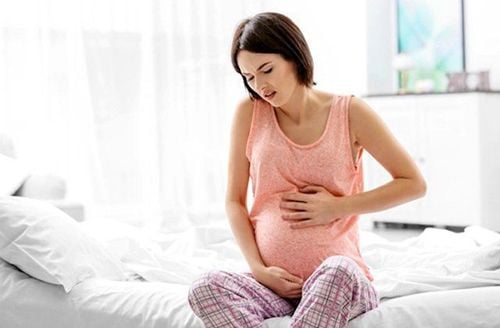Buttock pain during pregnancy can be caused by abnormalities in the buttocks (such as hemorrhoids). It can also be referred pain spreading from the lower back to the buttocks. Pregnancy-related buttock pain usually resolves after childbirth, but some women may continue to experience hemorrhoids after giving birth.
1. Causes of Buttock Pain During Pregnancy

Hemorrhoids
Hemorrhoids are swollen veins in the anus or rectum. Pregnant women are particularly prone to hemorrhoids due to the pressure exerted by the uterus on the anus and rectum. If you stand for long periods due to work or hobbies, the pain may worsen.Labor Pains / Contractions
Women experience different types of contractions. Some feel cramping pains in the abdomen and lower back, which may radiate down to the buttocks. The nature of the pain can vary. Some may experience cramping sensations, while others may feel pressure, sharp pain, or shooting pain.
Braxton-Hicks contractions can be uncomfortable but are typically not painful. If the contractions cause buttock pain, contact your doctor.
Pelvic Pain
The pelvis is a ring of bones surrounding the body at the base of the spine. Pelvic pain occurs in the front and/or back of the pelvis, and it can also affect other areas such as the hips or thighs. It may involve the sacroiliac joints at the back and/or the pubic symphysis joint at the front. Pelvic pain was once known as symphysis pubis dysfunction.
Pelvic pain affects 1 in 5 pregnant women. This pain occurs when the added weight of the baby and pregnancy-related movements in the pelvis begin to compress and cause pain in the pelvic region.
Many women also experience aching in the buttocks area. Other symptoms may include a grinding or aching sensation in the pelvic area, with pain worsening during movement. Although pelvic pain is uncomfortable, it is not harmful to your baby.
Sciatica
Sciatica is a condition that occurs when there is pressure on the sciatic nerve running from the buttocks down to the legs. Pregnancy can irritate or inflame the sciatic nerve. Your enlarged uterus may exert additional pressure on the sciatic nerve.
By the third trimester, changes in the baby's position may directly affect the nerves in your buttock area, causing buttock pain.
You may also experience a burning sensation in the back, buttocks, and legs. Some women also report shooting pain that radiates down the leg.
2. When to Call Your Doctor?
Regardless of the cause, buttock pain can make it difficult to carry out everyday activities comfortably. If you experience any of the following symptoms, call your doctor:
- The pain is so severe that it makes you uncomfortable
- You are losing a significant amount of blood (more than typical hemorrhoids, which may cause only small amounts of blood)
- You have experienced a sudden gush of fluid from the vagina or "water breaking"
- You lose control of your bladder or bowels
- The pain never subsides
2.1 Medical Treatment
An estimated 14% of pregnant women use opioid pain medications during pregnancy. Examples of prescribed medications include oxycodone and hydrocodone.
Typically, women take these medications for a week or less. Back pain is the most common reason for doctors to prescribe these medications.
If your buttock pain does not respond to over-the-counter treatments and home remedies, your doctor may consider prescribing pain medication.
However, the fewer medications you use during pregnancy, the better. This will reduce the chances that the medication may affect your baby's growth and/or development.
2.2 Home Treatment
If your pain is caused by hemorrhoids, you can try the following home treatments to alleviate discomfort:
- Soak in a warm bath or sitz bath. A sitz bath is a plastic tub that fits over your toilet. You can fill it with warm water, sit, and soak without needing to take a full bath.
- Try witch hazel. Apply a few drops of witch hazel onto a sanitary pad that you can wear to reduce inflammation. You can change the witch hazel pad throughout the day to continue reducing inflammation.
- Avoid sitting or standing for too long. Prolonged sitting or standing can increase pressure on your anus. Lying on your side can help relieve pressure.
- Drink plenty of water every day. This can help reduce the risk of constipation, which can make bowel movements more difficult.
- Eat fiber. Follow a diet high in fiber with whole grains, fruits, and vegetables.
- You can also ask your doctor about creams and/or stool softeners that may help reduce the pain and strain associated with hemorrhoids.
3. Sciatica Pain Treatment Methods
For pain related to sciatica and/or pelvic pain, you can take the following steps:
- Take over-the-counter pain relievers like acetaminophen to ease discomfort.
- Take warm baths and/or showers to soothe tense muscles.
- Wear a pelvic support belt (also called a maternity belt) to reduce pressure on your lower back and pelvic bones.
- Avoid activities that may worsen the pain, such as lifting heavy objects, keeping your legs close together when turning in bed, or getting out of the car.
- Place a pillow under your belly and another between your legs when sleeping. This can help promote the proper body position.
- You can also ask your doctor if cold and/or hot compresses are suitable for the areas of pain.

4. What are your treatment options for pelvic pain?
A physical therapy specialist will suggest the most suitable treatment for you. This may include:
- Advice on avoiding movements that could aggravate the pain. You will receive recommendations on the best positions for movement and rest, as well as how to pace activities to reduce pain.
- Exercises to reduce pain and make it easier for you to move. These exercises should also strengthen your abdominal and pelvic floor muscles to improve balance and posture, stabilizing your spine.
- Manual therapy (hands-on treatment) for muscles and joints by a physical therapist, chiropractor, or orthopedic doctor who specializes in pelvic pain during pregnancy. They will offer gentle techniques to move or adjust joints back into position, helping them move normally again.
- Warm baths, or hot or cold compresses
- Hydrotherapy
- Acupuncture
- Support belts or crutches
Vinmec International General Hospital offers a comprehensive maternity care program for expectant mothers from the early months of pregnancy, including regular prenatal check-ups, 3D and 4D ultrasounds, and routine tests to ensure the mother’s health and the baby's proper development. Expectant mothers will receive health consultations and check-ups under the close monitoring of experienced obstetricians, helping mothers gain more knowledge to protect their health during pregnancy and minimize complications that may affect both the mother and child.
To schedule an appointment at the hospital, please call the HOTLINE or book an appointment directly HERE. Download the MyVinmec app to manage, track your appointments, and book appointments anytime, anywhere.
References:
How do you treat pregnancy hemorrhoids and constipation. (2013, January)kidshealth.org/parent/pregnancy_center/q_a/piles.html
How to handle sciatica during your pregnancy. (2014, December 17)health.clevelandclinic.org/2014/12/how-to-handle-sciatica-during-your-pregnancy/
More than 14 percent of pregnant women prescribed opioids, study says. (2014, February 12)asahq.org/about-asa/newsroom/news-releases/2014/02/opioids-in-pregnancy
Pelvic girdle pain and pregnancy. (2015)rcog.org.uk/globalassets/documents/patients/patient-information-leaflets/pregnancy/pi-pelvic-girdle-pain-and-pregnancy.pdf
Types of back pain in pregnancy. (2009, December 3)spine-health.com/conditions/pregnancy-and-back-pain/types-back-pain-pregnancy











